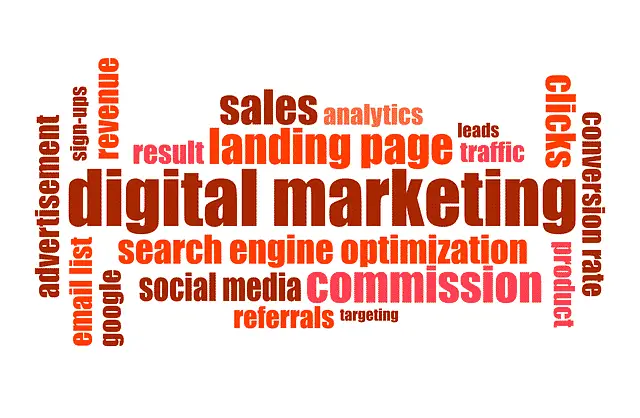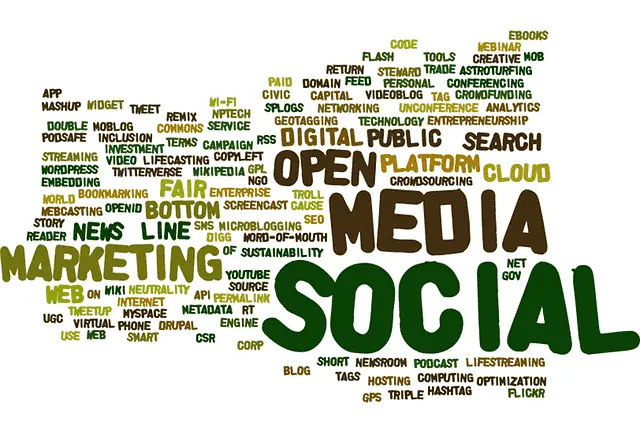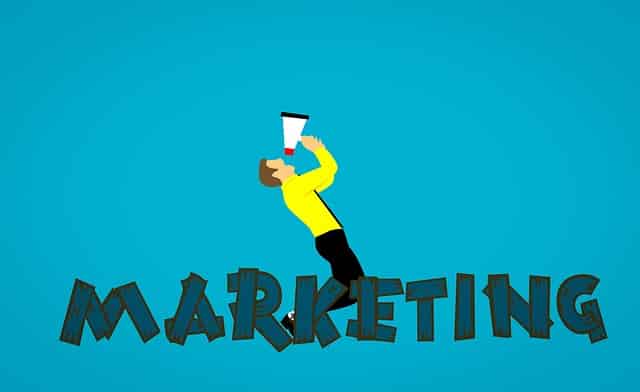In the past, a company was known mainly through newspaper advertisements, street posters, or flyers distributed during street marketing operations.
But with the progress of technology, things have changed. In this increasingly digital world, it is now essential to go digital to promote your business.
In fact, do you know the difference between digital marketing and social media marketing? Although these two concepts are closely related, it is important to distinguish between them, to understand the objectives and specificities of each one so that your marketing strategy is successful.
What is digital marketing?

Digital marketing is an umbrella term that encompasses different strategies such as search engine optimization and email marketing. It is a process by which a company promotes its brand, products, or services by implementing a customized mix of digital marketing channels.
Its objective is not only to increase profits but also to develop the company’s reputation, build a relationship with its target audience, and many others.
Digital marketing can take the form of TV ads, banners, pop-ups, SMS, videos, etc.
Is digital marketing exclusively online?
Contrary to what you might think, digital marketing was not born with the Internet. It has even existed for many decades! Indeed, this method of promotion can take the form of Internet marketing or the use of digital channels that do not require the Internet.
Some of the different digital channels available include emails, smartphones, digital screens, search engines, websites, social media (such as Facebook, Instagram, Twitter, etc.), blogs, digital billboards, and more!
Examples of online digital marketing include:

- A website: this is a very powerful channel needed to execute various online marketing campaigns;
- Content marketing such as creating and sharing e-books, infographics, podcasts, webinars, blog posts, etc. ;
- Social Media Marketing (SMM) which we will see later;
- Search Engine Marketing (SEM) which includes SEO (Search Engine Optimization) and SEA (Search Engine Advertising), i.e. natural and paid search;
- Email Marketing which uses conversion tunnels to transform prospects into customers;
- Affiliate marketing: influencers promote the company’s products and receive a commission each time a sale is made or a prospect is introduced;
- Advertising: it allows to reach Internet users on certain digital platforms via paid advertisements according to their interests, age, etc. ;
- Mobile marketing via the development of applications on Google Play and Apple Store;
- Video marketing: video campaigns can be integrated with content marketing, SEO and broader social media marketing campaigns.
Offline forms of digital marketing use:
- Radio;
- Television;
- SMS text messaging;
- Digital billboards whether indoor or outdoor.
These lists are far from exhaustive. At the border of the Internet and the real world lies for example the QR code. This paper-based hyperlink connects the physical world to the online world and can be used in street marketing campaigns.
What is social media marketing?

As we have seen before, social media marketing (SMM) is only one aspect of digital marketing. First of all, let’s go back to the definition of social media. It is important to differentiate between social media and social networks.
A social network is actually a type of social media, i.e. a platform that allows users to share their texts, images, or videos directly to the people connected with them. Blogs and website forums are also part of social media.
Social media marketing focuses solely on the marketing strategies implemented via these different channels. Just like digital marketing in general, the channels chosen will depend on your target audience.
In recent years, social networks have become particularly popular and have transformed the way we communicate with others. The most popular ones are Facebook, Instagram, Twitter, Pinterest, LinkedIn, or even YouTube.
But each of them does not attract the same type of audience. For example, people under 18 use Snapchat or TikTok more, while Facebook is more suited to a more mature audience.
Social media marketing can be free or paid.

It is possible to share valuable content for free in order to increase audience engagement and increase followers on social networks. To do this, it is necessary to learn about all the technicalities of each social media to get the best out of each of them.
On the other hand, paid advertising on different platforms is a very effective way to quickly reach your target audience and promote your product or services on Facebook, Instagram, or YouTube.
What are the main differences between digital marketing and social media marketing?

Let’s now go over the main differences between social media mark marketing…
1. Their objectives
Digital marketing is designed to inform a potential customer about a product, an offer, or a promotion. It aims to reach the target audience through various touchpoints. Prospective customers can easily find the company through search engines or even television commercials.
With social media marketing, the goal is to get people to notice you. This method aims to create engaging content on social media, catch a potential buyer’s attention and convince them to place an order.
2. Means used
Social media marketing is used exclusively online, social media marketing uses one or more social media platforms (Instagram, YouTube, etc.).
Digital marketing, on the other hand, strives to reach the target audience using all available digital platforms. This allows the company to go beyond the Internet to reach future customers (television, SMS, etc.) and promote its products and services.
3. Speed of customer response
Social media marketing is faster than any other digital marketing platform. On social networks, the company is constantly connected with its customers.
Thousands of users can interact with its posts instantly in the form of likes, comments, or shares. Sharing information via other platforms can require lengthy processes.
4. Outreach
Given the broader outreach options, digital marketing will reach more customers than social media marketing, which has a limited reach to social media users. This is because digital marketing encompasses not only all social media but also many other digital platforms and tools.
Therefore, even people who do not use the Internet will be able to be informed about the company’s products and services.
What is the most important strategy?

Keep in mind that social media marketing is only one part of digital marketing. However, it should be a crucial part of your strategy to keep your company close to your customers.
To give a modern and accessible image of your company, it is essential to be present on social networks while remaining authentic and striving to be creative and trendy.
Otherwise, users of these networks will get the impression that the company is not open to public communication with its consumers.
Your social media is a place where your customers can ask you questions, learn more about your business, understand and communicate with your brand in a more personal way and even contact your customer service team.
It’s not just about delivering a pre-written marketing message, it’s about connecting with people. It’s easy to get attention by running contests or asking questions. You can ask your customers for their opinion on your products and find out what they need. By talking to them, you will understand how to improve your products, content, or services.
Also, your biggest fans can do your marketing for you by sharing positive reviews, testimonials, product demonstration videos, etc. on social media.
Social media marketing is a powerful tool that has many benefits for your business, however, note that its use is to support your overall digital marketing efforts. Be sure to organize a well-rounded online presence that also relies on email marketing, SEO, etc.
Your social and other digital campaigns should ideally work together. Take advantage of your most relevant social media channels to promote your videos, new website content or to collect new subscribers to your mailing list.
Only by combining the right channels for your business can you create the right marketing strategy.
